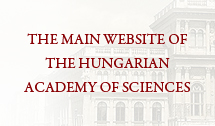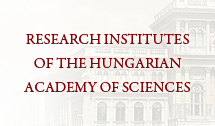

















 |

Research Centre for Economic and Regional Studies, Hungarian Academy of Sciences, Institute for World Economics
H-1014 Budapest, Országház u 30., Hungary
PO Box 936, H-1535 Budapest, Hungary
+ 36 1 224 6700
+ 36 1 224 6765
e-mail: vki@vki.hu
www.vki.hu
GENERAL ACTIVITIES
The Institute for World Economics (IWE) of the Hungarian Academy of Sciences operated in its present form from 1973 to 2012. Its predecessor, the Afro-Asian Research Centre, was founded in 1965.
The IWE conducts independent theoretical and applied research in response
to global and regional challenges, problems and trends that call for changes
in international cooperation and domestic policy.
A strategic, interdisciplinary future-oriented approach is taken to the
research, drawing on a network of cooperation partners at home and
abroad. Great importance is attached to publicizing the findings widely.
IWE research teams also produce policy-oriented studies under contract.
Research and analysis of this kind are produced for Hungarian policymakers,
the business sector and international organizations.
The main areas of research
1) Global political, social and economic transformation in the
21st century and its implications for the European region,
Hungary and Russia
The IWE studies the global economy with a particular eye to the future
engines of change, the main driving forces of innovation and technological
change, environmental issues, the energy sector and the evolving power
structure in the global political system.
The latest researches extend to multilateral cooperation in global
governance and to the main sources of inequality and social change. One
special area of research is the strategies of the multinational corporations
and competition among them in Europe and the world economy. Increasing
attention is being focused on studying the global energy sector and the
developments in European energy policy.
2) The European Union and European integration
The IWE has been following developments in European integration for 30
years through international and domestic research projects, from the
European Economic Community and up to the European Union of today.
The result is a body of expertise on the main reform issues of widening and
deepening the EU and on the opportunities and challenges that Hungary
faces as an EU member.
Likewise central to the IWE research objectives is analysis of Europe's role
and importance in global processes. There are several research projects
directed at future prospects for the EU, notably the continuing development
of political union, adjustments to globalization, the trends towards
renationalization, multi-speed processes of integration, the competitiveness
of Europe, and the potential evolution of common social values.
3) Central, South-Eastern and Eastern Europe: economic
transition and adjustment
Prominent research topics in recent years have included the socio-economic
transformation of the Central, South-Eastern and East European countries,
conditions for sustainable growth, strategies and methods of catching up,
and the causes and effects of unsuccessful modernization. The research
experience gained over almost 20 years offers a fruitful terrain for reviewing
and re-evaluating the features of this transformation.
Increasing attention is being paid to the behaviour of new member-states as
they integrate into the EU and to their relations with each other. Research
has focused recently on Bulgaria and Romania as new member-states, and
on the West Balkan countries, Croatia and Ukraine, as neighbouring
countries that are improving their political and economic relations with
Hungary and the EU. The work in these areas is facilitated by the IWE's
professional relations with other research institutes in the region and by the
opportunities for cooperation that have arisen over the last 30 years of
active research and cooperation.
4) Key issues of economic development
Development studies and development theory have traditionally been an
important field for the IWE. They cover the major macroeconomic issues
faced by developing countries face, such as adjustment to the world
economy, structural transformation, regional cooperation, debt crises,
population explosions, the world agricultural system and its products, food
problems, and the oil question. There is also long-term research into the role
and function of international policies and organizations: world trade and the
WTO, agricultural policies, reform and the EU Common Agricultural Policy.
Complementing that is research into specific countries and regions and
topics of special interest, including key economic and social issues in the
Middle East, North Africa and Central Asia. The research into the
development and catching-up processes (from an international or a
domestic perspective) extends to fundamental topics such as
competitiveness, R & D, innovation, and the economic challenges of a
knowledge society. Special heed is paid to urban and regional development,
global environmental issues, and several economic and social aspects of
sustainable development.
5) Asian countries
A special regional focus is given to three Asian countries - China, Japan, and
India - in line with their increasing economic importance. Their main
features and long-term development are monitored by an IWE research
team of five.
With China, the research focus is on its role in the world economy, its
relationship with the EU, and the main economic and social aspects of its
transformation process. The economic prospects of Japan, India and some
countries in Central Asia are also the object of long-term research. The IWE
conducts both macro and micro-level studies, including responses to
globalization, analysis of modernization strategies, and regional business
relations and management methods.
Management and staff
Director: Judit Kiss, Doctor of Economic Sciences
Deputy director. Tamás Novák, Ph.D.
Senior adviser: Mihály Simai, member of the Hungarian Academy of Sciences, research professor
Research directors
András Inotai, Doctor of Economic Sciences, senior research fellow
Tamás Novák, Ph.D., senior research fellow (Central, South-Eastern and Eastern Europe Research Centre)
Margit Rácz, Ph.D., Candidate of the Hungarian Academy of Sciences, senior research fellow (European Integration Research Centre)
Senior research fellows (holding Ph.D. degrees):
Annamária Artner, Kálmán Dezséri, David Ellison, Andrea Éltető, Péter Farkas, Tamás Fleischer, Klára Fóti, István Kőrösi, Zsuzsa Ludvig, Miklós Somai, Andrea Szalavetz, Miklós Szanyi, András Székely-Doby, Tamás Szigetvári, Krisztina Vida, Csaba Weiner.
Research fellows
Sándor Meisel, Gábor Monori, Gábor Túry, Katalin Völgyi.
Research assistants
Zsuzsánna Biedermann, Attila Hugyecz, Ágnes Orosz, Ágnes Szunomár.
Further information appears in English and Hungarian on the www.vki.hu
website and in detailed annual reports.

|


|
 |



